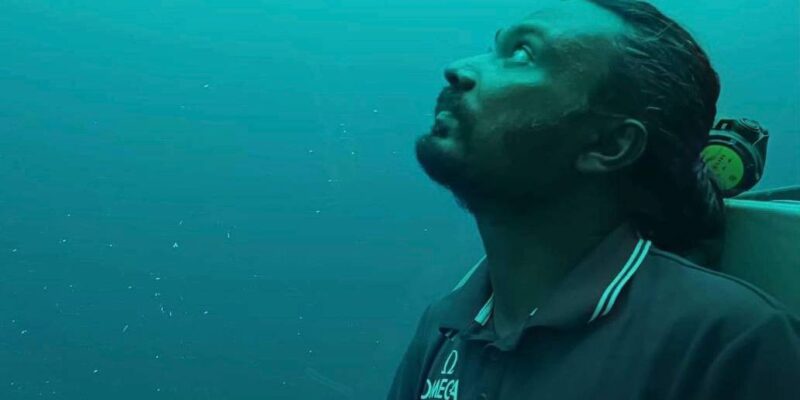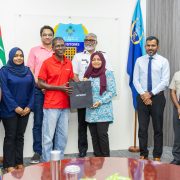The talented Marine Biologist from Thiladhunmathi, HDh. Vaikaradhoo Mohamed Shimal had a special dive under Nekton Maldives Mission to study the Maldivian seas.
Mohamed Shimal is a Marine Biologist is the scientist leading the reef-based fishery research at Maldives Marine Research Institute (MMRI) and Data Manager for the currently ongoing Nekton expedition.
To conduct the first systematic survey and sampling of the waters surrounding the Maldives from the surface to 1,000 meters below sea level, the Nekton Maldives Mission set the sail on September 4, 2022.
Shimal joined MMRI back in 2015, since then he has devoted his time and efforts to better understand the context and challenges facing marine scientific research in the Maldives.
The Maldives is a country with 99% of its territory is ocean and the remaining 1% is on average 1.5 meters above sea level. As a result, the threat posed by the rising seas to the Maldives is escalating. The scientists anticipate finding the old beach line from 20,000 years ago at depths of about 120 meters, when sea levels surged due to ice melt from the Last Glacial Maximum. Nekton Maldives Mission goal includes looking into how marine life has changed in response to sea level rise.
Only 300 of the 100,000 seamounts above 1000 meters in the world’s oceans have ever had biological samples taken. Maldivian folklore frequently makes reference to the 34 seamounts, which are vital spawning sites for regional fisheries like tuna.
My message in the bubble is dedicated to kids, who'll be the ones to take over and amplify the voice for ocean and deep sea – inspired by my son's fascination with deep sea creatures and with the hope of seeing Maldivian kids grow up to be deep sea scientists. https://t.co/JD7TcsQi7e
— Mohamed Shimal (@Raabulha) September 18, 2022
Since Shimal has a keen interest in Data Management and Analysis, he has gained expertise via formal education and self-learning, co-formulating the first ever data management framework at MMRI as well as establishing continuous and consistent monitoring programs for reef-based fisheries in the Maldives.
According to Shimal, it was a special dive for him since he got to see the stunning geomorphological features at 500 meter depth at Huvadhoo for around four hours, witnessing the diversity and abundance of deep sea fishes and other organisms before setting foot on any land of the Huvadhoo atoll.
Moreover, Shimal noted that he is very confident that knowledge generate from the expedition will spark new interests in studying ecological and geomorphological process of deep sea and seabed in the Maldives, especially opening up a whole new field of research for Maldivians to pursue.
The Mission has deployed two of the most advanced human-occupied submersibles, alongside robotic and autonomous systems, and over a dozen research technologies supported by 40 partners – 16 Maldivian and 24 international. Shimal is one of the 16 Maldivian included in the ongoing Nekton mission.
The expedition is a combined effort between the Maldives government and UK-based Nekton to map, sample, and collect data on ocean health that can help policymakers in the Maldives and elsewhere as the climate crisis worsens.












 in #Thiladhunmathi
in #Thiladhunmathi
Comments